(完整)小学形容词的比较级、最高级
小学英语必背比较级和最高级
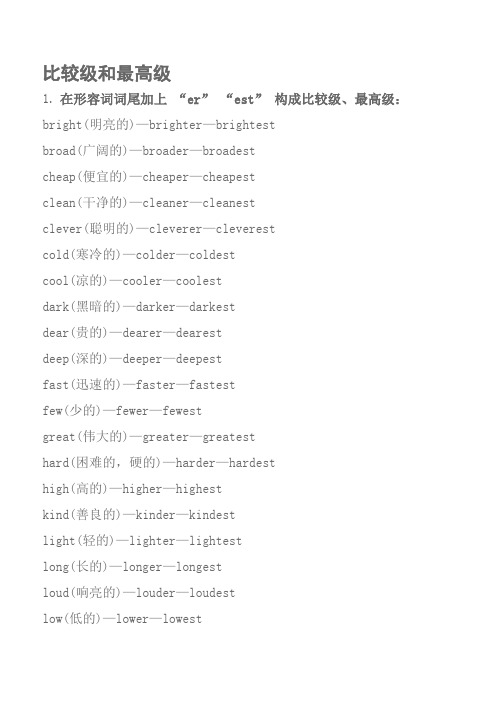
比较级和最高级1.在形容词词尾加上“er”“est”构成比较级、最高级:bright(明亮的)—brighter—brightestbroad(广阔的)—broader—broadestcheap(便宜的)—cheaper—cheapestclean(干净的)—cleaner—cleanestclever(聪明的)—cleverer—cleverestcold(寒冷的)—colder—coldestcool(凉的)—cooler—coolestdark(黑暗的)—darker—darkestdear(贵的)—dearer—dearestdeep(深的)—deeper—deepestfast(迅速的)—faster—fastestfew(少的)—fewer—fewestgreat(伟大的)—greater—greatesthard(困难的,硬的)—harder—hardesthigh(高的)—higher—highestkind(善良的)—kinder—kindestlight(轻的)—lighter—lightestlong(长的)—longer—longestloud(响亮的)—louder—loudestlow(低的)—lower—lowestnew(新的)—newer—newestpoor(穷的)—poorer—poorestquick(快的)—quicker—quickestquiet(安静的)—quieter—quietestrich(富裕的)—richer—richestshort(短的)—shorter—shortestslow(慢的)—slower—slowestsmall(小的)—smaller—smallestsmart(聪明的)—smarter—smartestsoft(柔软的)—softer—softeststrong(强壮的)—stronger—strongestsweet(甜的)—sweeter—sweetesttall(高的)-taller-tallestthick(厚的)—thicker—thickestwarm(温暖的)—warmer—warmestweak(弱的)—weaker—weakestyoung(年轻的)—younger—youngest2.双写最后一个字母,再加上“er”“est”构成比较级、最高级:big(大的)—bigger—biggestfat(胖的)—fatter—fattesthot(热的)—hotter—hottestsad(伤心的)—sadder—saddestthin(瘦的)—thinner—thinnestwet(湿的)—wetter—wettestmad(疯的)—madder—maddest3.以不发音的字母e结尾的形容词,加上“r”“st”构成比较级、最高级:able(能干的)—abler—ablestbrave(勇敢的)—braver—bravestclose(接近的)—closer—closestfine(好的,完美的)—finer—finestlarge(巨大的)—larger—largestlate(迟的)—later—latestnice(好的)—nicer—nicestripe(成熟的)—riper—ripestrude(粗鲁的)—ruder—rudestsafe(安全的)—safer—safeststrange(奇怪的)—stranger—strangestwide(宽广的)—wider—widest wise(睿智的,聪明的)—wiser—wisest white(白的)—whiter—whitest4.以字母y结尾的形容词,把y改为i,再加上“er”“est”构成比较级、最高级:busy(忙碌的)—busier—busiestdirty(脏的)—dirtier—dirtiestdry(干燥的)—drier—driestearly(早的)—earlier—earliesteasy(容易的)—easier—easiestfriendly(友好的)—friendlier—friendliest fun—funnier—funniesthappy(开心的)—happier—happiesthealthy(健康的)—healthier—healthiestheavy(重的)—heavier—heaviesthungry(饿的)—hungrier—hungriestlazy(懒惰的)—lazier—laziestlucky(幸运的)—luckier—luckiestnaughty(调皮的)—naughtier—naughtiestnoisy(嘈杂的)—noisier—noisiestpretty(美丽的)—prettier—prettiestsilly(傻的)—sillier—silliestspicy(辣的)—spicier—spiciestthirsty(渴的)—thirstier—thirstiestugly(丑的)—uglier—ugliest5.双音节、多音节形容词,在单词前面加上“more”“most”构成比较级、最高级:afraid(害怕的)—more afraid—most afraidbeautiful(美丽的)—more beautiful—most beautifulcareful(仔细的)—more careful—most carefulcheerful(开心的)—more cheerful—most cheerfulcrowded(拥挤的)—more crowded—most crowdeddangerous(危险的)—more dangerous—most dangerousdelicious(美味的)—more delicious—most deliciousdifficult(困难的)—more difficult—most difficultexciting(令人兴奋的)—more exciting—most exciting expensive(昂贵的)—more expensive—most expensivefamous(著名的)—more famous—most famoushard-working(勤奋的)—more hard-working—most hard-working helpful(有帮助的)—more helpful—most helpfulhonest(诚实的)—more honest—most honestimportant(重要的)—more important—most importantinteresting(有趣的)—more interesting—most interesting polite(有礼貌的)—more polite—most politeterrible(可怕的)—more terrible—most terribletired(累的)—more tired—most tired6.不规则变化的形容词:bad(坏的)—worse—worstfar(远的)—farther—farthest (far—further—furthest)good(形容词好的)—better—bestwell(副词好的,身体好的)—better—bestill(病的)—worse—worstlittle(少的)—less—leastmany(形容可数多的)—more—mostmuch(形容不可数多的)—more—mostold(年老的)—older—oldest ( old—elder—eldest)。
完整版)比较级最高级变化规则总结
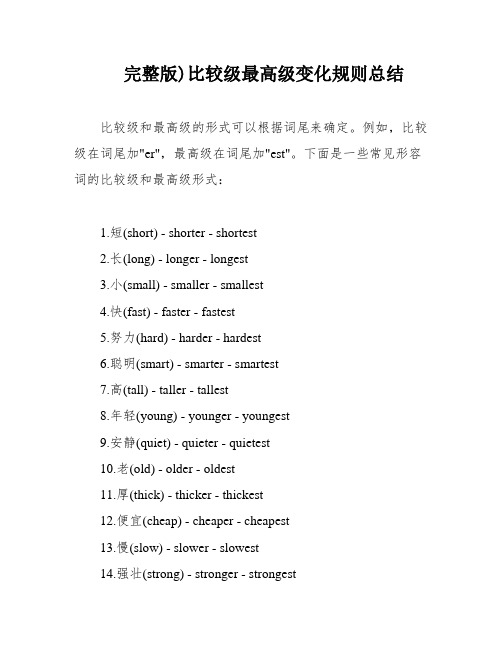
完整版)比较级最高级变化规则总结比较级和最高级的形式可以根据词尾来确定。
例如,比较级在词尾加"er",最高级在词尾加"est"。
下面是一些常见形容词的比较级和最高级形式:1.短(short) - shorter - shortest2.长(long) - longer - longest3.小(small) - smaller - smallest4.快(fast) - faster - fastest5.努力(hard) - harder - hardest6.聪明(smart) - smarter - smartest7.高(tall) - taller - tallest8.年轻(young) - younger - youngest9.安静(quiet) - quieter - quietest10.老(old) - older - oldest11.厚(thick) - thicker - thickest12.便宜(cheap) - cheaper - cheapest13.慢(slow) - slower - slowest14.强壮(strong) - stronger - strongest15.弱(weak) - weaker - weakest16.新(new) - newer - newest17.温暖(warm) - warmer - warmest18.冷(cold) - colder - coldest19.凉爽(cool) - cooler - coolest20.害羞(shy) - shyer - XXX21.紧(tight) - tighter - tightest22.干净(clean) - cleaner - cleanest23.聪明(clever) - cleverer - cleverest对于以不发音"e"结尾的单音节词,比较级直接加"r",最高级直接加"st"。
完整小学英语比较级和最高级
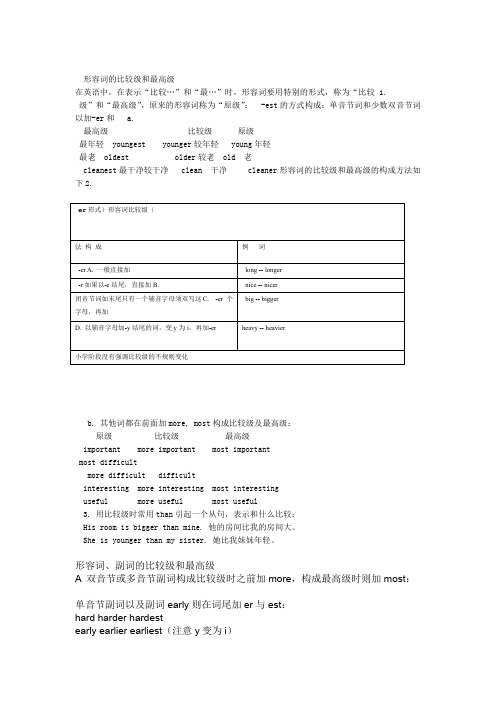
形容词的比较级和最高级在英语中,在表示“比较…”和“最…”时,形容词要用特别的形式,称为“比较 1.级”和“最高级”,原来的形容词称为“原级”: -est的方式构成:单音节词和少数双音节词以加-er和 a.最高级比较级原级最年轻 youngest younger较年轻 young年轻最老 oldest older较老 old 老cleanest最干净较干净 clean 干净 cleaner形容词的比较级和最高级的构成方法如下2.b. 其他词都在前面加more, most构成比较级及最高级:原级比较级最高级important more important most importantmost difficultmore difficult difficultinteresting more interesting most interestinguseful more useful most useful3. 用比较级时常用than引起一个从句,表示和什么比较:His room is bigger than mine. 他的房间比我的房间大。
She is younger than my sister. 她比我妹妹年轻。
形容词、副词的比较级和最高级A 双音节或多音节副词构成比较级时之前加more,构成最高级时则加most:单音节副词以及副词early则在词尾加er与est:hard harder hardestearly earlier earliest(注意y变为i)B 不规则变化:well better bestbadly worse worstlittle less leastmuch more mostfar farther farthest(仅用于指距离)further furthest.much,more,mostA more和most的用法相当自由:You should ride more.你必须多骑马。
(完整)小学形容词的比较级和最高级.doc

形容的比和最高一.形容的比和最高的用法在英中,在表示两者作比,形容要用特的形式,称“比”,三者及三者以上作比用“最高”,原来的形容称“原” 。
e.g. You look taller than me .你比我高。
You are heavier than me.你比我重。
I am the strongest in my class.我是我班最壮的。
二 . 形容比和最高句型构1. 比句型:主 A+ be+ 形容比 + than + B A⋯⋯比B⋯⋯e.g. He is older than me.他比我年。
【拓展】比的其他表达方式①"the+ 形容比 +of the two+ ⋯⋯ " 表示 "... 是两者中⋯的 " 。
e.g. He is the heavier of the two boys.Look at the two boys. My brother is the taller of the two.② " 比 +and+比 " 表示 " 越来越⋯⋯ " 。
e.g. He is getting taller and taller.他越来越高。
③ "the+ 比, the+ 比 " 表示 " 越⋯⋯越⋯⋯ " 。
e.g. The more careful you are,the fewer mistakes you'll make你越心,就会越少犯。
he more we get together, the happier we will be.我聚得越多,我就越开心The harder you work , the better you'll be.你越努力工作,你就会得越好。
助:1.Jim is _______ than all the others. (tall)2.Things are getting _______ and _______. (bad)3.The higher you climb, the _______ it will be. (cold)2. 最高句型:主 + be+ the +形容最高+介短(介短: in my class ,in the room ,in the hall⋯)e.g. He is the tallest in our class.【拓展】最高的其他形式① " 主 +be+ one of the+形容最高+复数名+in/of短"表示"⋯⋯是⋯⋯中最⋯⋯之一 "e.g. Beijing is one of the largest cities in China.②序数 +最高e.g. Hainan Island is the second largest island in China.助:1.The changjiang river is ____________________ (long) river in China.2. The Yellow River (Huang He) is ________________ (第二) river in China3.A. 形容的比和最高化构成原比最高tall taller tallestlong longer longest 音一般尾加 -er, -est old older oldestsmall smaller smallest 和以字母 e 尾的形容或副nice nicer nicest少, 直接加 -r,-st fine finer finest数large larger largest双以重音尾的形容big bigger biggest音或副 , 如末尾只有一个音hot hotter hottest 字母 , 双写字母 , 再加fat fatter fattest-er,-est thin thinner thinnest以“ 音字母 +y” 尾的形heavy heavier heaviest容或副,把 yi ,再 busy busier busiest加 -er,-est early earlier earliesteasy easier easiestB. 部分双音与多音的比在原之前加more, 最高在原之前加 most beautiful---more beautiful---most beautifulinteresting--- more interesting – most interestingdifficult--- more difficult – most difficultC. 不化的形容 :little / few -less–least good–better - bestbad/ill - worse–worst far-- farther/further—farthest/furthest many/much – more – moste.g. 比一下下列句子,悟原、比、最高的用法。
(完整版)小学英语形容词的比较级
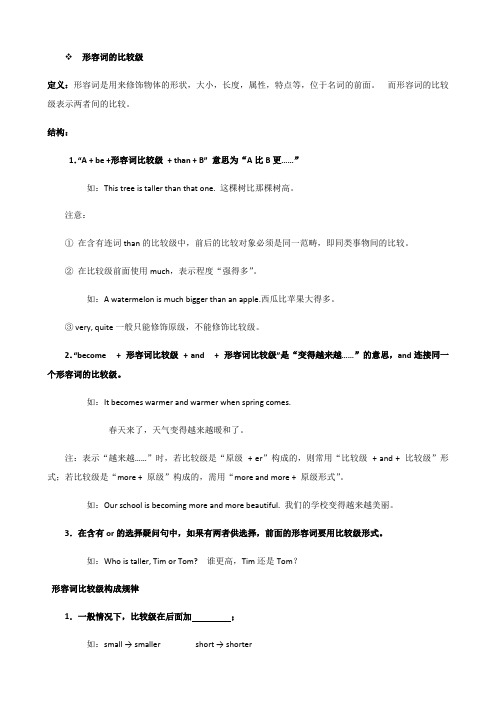
形容词的比较级定义:形容词是用来修饰物体的形状,大小,长度,属性,特点等,位于名词的前面。
而形容词的比较级表示两者间的比较。
结构:1.“A + be +形容词比较级+ than + B” 意思为“A比B更……”如:This tree is taller than that one. 这棵树比那棵树高。
注意:①在含有连词than的比较级中,前后的比较对象必须是同一范畴,即同类事物间的比较。
②在比较级前面使用much,表示程度“强得多”。
如:A watermelon is much bigger than an apple.西瓜比苹果大得多。
③ very, quite一般只能修饰原级,不能修饰比较级。
2.“become + 形容词比较级+ and + 形容词比较级”是“变得越来越……”的意思,and连接同一个形容词的比较级。
如:It becomes warmer and warmer when spring comes.春天来了,天气变得越来越暖和了。
注:表示“越来越……”时,若比较级是“原级+ er”构成的,则常用“比较级+ and + 比较级”形式;若比较级是“more + 原级”构成的,需用“more and more + 原级形式”。
如:Our school is becoming more and more beautiful. 我们的学校变得越来越美丽。
3.在含有or的选择疑问句中,如果有两者供选择,前面的形容词要用比较级形式。
如:Who is taller, Tim or Tom? 谁更高,Tim还是Tom?形容词比较级构成规律1.一般情况下,比较级在后面加;如:small → smaller short → shorter2.在重读闭音节(即:辅音+元音+辅音)中,先双写末尾的辅音字母,比较级加-er,如:big →bigger hot →hotter3.以不发音e结尾的单音节词,比较在原级后加;如:large →larger nice →nicer4.以“辅音字母+y”结尾的双音节词,,比较级加;如:easy →easier heavy →heavier5.多数多音节词,比较级在前面加;如:beautiful → more beautiful different → more different6.有少数形容词的比较级是不规则的,必须熟记。
(完整版)比较级和最高级列表
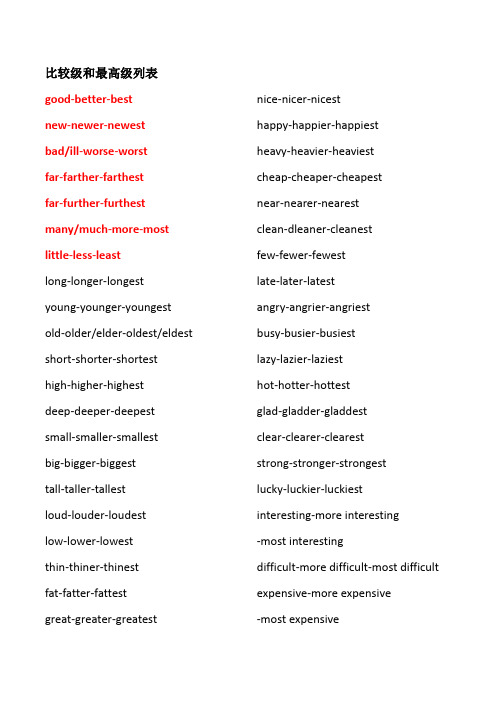
比较级和最高级列表good-better-bestnew-newer-newestbad/ill-worse-worstfar-farther-farthestfar-further-furthestmany/much-more-most little-less-leastlong-longer-longestyoung-younger-youngest old-older/elder-oldest/eldest short-shorter-shortesthigh-higher-highestdeep-deeper-deepestsmall-smaller-smallestbig-bigger-biggesttall-taller-tallestloud-louder-loudestlow-lower-lowestthin-thiner-thinestfat-fatter-fattestgreat-greater-greatest nice-nicer-nicesthappy-happier-happiestheavy-heavier-heaviestcheap-cheaper-cheapestnear-nearer-nearestclean-dleaner-cleanestfew-fewer-fewestlate-later-latestangry-angrier-angriestbusy-busier-busiestlazy-lazier-laziesthot-hotter-hottestglad-gladder-gladdestclear-clearer-cleareststrong-stronger-strongestlucky-luckier-luckiestinteresting-more interesting-most interestingdifficult-more difficult-most difficult expensive-more expensive-most expensive形容词比较级、最高级的构成一、规则变化1. 单音节词和少数双音节词(1)一般情况在原级词尾加-er构成比较级,加-est构成最高级。
(完整版)小学英语比较级
一、形容词、副词的比较级和最高级的构成规则1.大多数单词的变法small→smaller→smallest short→shorter→shortest great→greater→greatest clever→clevere r→cleverest narrow→narrower→narrowest tall→taller→tallest2.以不发音e结尾的单音节词,比较在原级后加-r,最高级在原级后加-st;large→larger→largest nice→nicer→nicest3.先双写末尾的辅音字母,比较级加-er,最高级加-est;big→bigger→biggest hot→hotter→hottest fat→fatter→fattest thin-thinner-thinnest sad-sadder--sa ddest 4.以“辅音字母+y”结尾的双音节词,把y改为i,比较级加-er,最高级加-est;easy→easier→easiest heavy→heavier→heaviest busy→busier→busiesthappy→happier→happiest5.其他双音节词和多音节词,比较级在前面加more,最高级在前面加most;beautiful→more beautiful→most beautifuldifferent→more different→most different注意:(1)形容词最高级前通常必须用定冠词 the,副词最高级前可不用。
6.有少数形容词、副词的比较级和最高级是不规则的,必须熟记。
good-----better------best好的well------better------best身体好的bad------worse------worst坏的ill--------worse-------worst病的many--------more------most许多 much------more--------most许多few------less-------least少数几个little-------less------least少数一点far------further------furthest更进一步,程度far------farther------farthest更远,路程old-------older------oldest年老的(指年纪)old------elder-------eldest年老的(指兄弟姐妹的排行)二、形容词、副词的比较级和最高级的用法1.“A + be +形容词比较级 + than + B”意思为“A比B更……”。
完整比较级和最高级
一、形容词的比较级和最高级变化规则;1、规则变化:(1)单音节词和少数双音节词一般在词尾加er或est:如: small ---smaller --- the smallest⑵以不发音的e字母结尾的加r,或st :如: late --- later --- the latest⑶以辅音字母加y结尾的变y为I加er或est:如: easy --- easier --- the easiest(4)以一个辅音字母结尾的重读闭音节词双写最后一个辅音字母再加er或est:如: big --- bigger --- the biggest以er,ow结尾的双音节词加er或est如: slow --- slower --- the slowest⑸多音节词前加more或most,副词最高级前省略the.如: important --- more important --- the most important2.不规则变化good / well --- better --- the best 好bad / badly / ill --- worse --- the worst 坏many / much --- more --- the most 多little --- less --- the least 少old --- older / elder --- the oldest / the oldest 老,旧far --- farther / further --- the farthest / the furthest 远常见形容词比较级、最高级变化一览表1.在形容词词尾加上“er”“est”构成比较级、最高级:bright (明亮的)一brighter—brightest broad (广阔的)一broader—broadest cheap (便宜的)一cheaper-cheapest clean (干净的)-cleaner-cleanestclever (聪明的)一cleverer -cleverestcold (寒冷的)一colder —coldest cool (凉的)-cooler -coolestdark (黑暗的)-darker -darkest deep (深的)一deeper -deepestfast (迅速的)一faster -fastest few (少的)一fewer -fewestgreat (伟大的)-greater -greatest hard (困难的,硬的)一harder —hardest high (高的)一higher —highest kind (善良的)一kinder —kindest light (轻的)一lighter —lightest long (长的)一longer —longest loud (响亮的)一louder —loudest low (低的)一lower —lowest near (近的)一nearer -nearest new (新的)一newer -newest poor (穷的)一poorer -poorest quick (快的)-quicker -quickest quiet (安静的)-quieter —quietestrich (富裕的)一richer —richest short (短的)一shorter —shortest slow (慢的)一slower -slowest small (小的)一smaller -smallestsmart (聪明的)一smarter -smartest soft (柔软的)一softer -softest strong (强壮的)一stronger -strongest sweet (甜的)一sweeter -sweetest tall (高的)-taller-tallest thick (厚的)一thicker —thickestwarm (温暖的)一warmer -warmestweak (弱的)一weaker -weakest young (年轻的)一younger -youngest2 .双写最后一个字母,再加上“er ” “est ”构成比较级、最高级:3 .以不发音的字母e 结尾的形容词,加上“r ” “st ”构成比较级、最高级:strange (奇怪的)一stranger -strangest wide (宽广的)-wider -widest wise (睿智的,聪明的)一wiser —wisestwhite (白的)一whiter —whitest 4 .以字母y 结尾的形容词,把y 改为i ,再加上“er ” “est ”构成比较级、最高级: busy (忙碌的)一busier —busiestdirty (脏的)一dirtier —dirtiest dry (干燥的)一drier —driestearly (早的)一earlier -earliest easy (容 易的)一easier —easiestfriendly (友好的)一friendlier —friendliest funny (好玩的)一funnier -funniesthappy (开心的)一happier -happiest healthy (健康的)一healthier -healthiest heavy (重的)一heavier -heaviest big (大的)一bigger —biggesthot (热的)一hotter —hottest sad(伤心的)一sadder -saddest wet(湿的)一wetter -wettest fat (胖的)一fatter —fattest red (红的)一redder -reddest thin (瘦的)一thinner —thinnest mad (疯的)一madder —maddestable (能干的)一abler —ablest close (接近的)一closer -closest large (巨大的)一larger -largest nice (好的)一nicer -nicest rude(粗鲁的)一ruder —rudest brave (勇敢的)一braver —bravestfine (好的,完美的)一finer —finestlate (迟的)一later —latestripe (成熟的)一riper —ripest safe (安全的)一safer -safesthungry (饿的)一hungrier -hungriestlazy (懒惰的)一lazier -laziest lucky (幸运的)一luckier -luckiestnaughty (调皮的)一naughtier -naughtiest thirsty (渴的)-thirstier -thirstiest ugly (丑的)一uglier —ugliest4 .双音节、多音节形容词,在单词前面加上“more ”“most ”构成比较级、最高 级:afraid (害怕的)一more afraid —most afraidbeautiful (美丽的)一more beautiful —most beautifulcareful (仔细的)一more careful -most carefulcheerful (开心的)一more cheerful —most cheerfulcrowded (拥挤的)一more crowded -most crowdeddangerous (危险的)一more dangerous -most dangerousdelicious (美味的)一more delicious —most deliciousdifficult (困难的)一more difficult —most difficultexciting (令人兴奋的)一more exciting —most excitingexpensive (昂贵的)一more expensive -most expensivefamous (著名的)一more famous —most famousfrightened (受惊的)一more frightened -most frightenedfrightening (令人害怕的)一more frightening -most frighteninghard-working (勤奋的)一more hard-working —most hard-workinghelpful (有帮助的)一more helpful —most helpfulhonest (诚实的)一more honest —most honestimportant (重要的)一more important -most importantinteresting (有趣的)一more interesting -most interestingpolite (有礼貌的)一more polite —most politeterrible (可怕的)一more terrible -most terribletired (累的)一more tired -most tired5 . 不规则变化的形容词:bad (坏的)一worse -worstgood (好的)一better —best far (远的)一farther —farthest (far —further —furthest )ill (病的)一worse -worst little (少的)一less -least many (多的)一more —most much (多的)一more —mostold (年老的)一older —oldest ( old —elder —eldest )well (好的,身体好的)一better -bestnoisy (嘈杂的)一noisier -noisiestsilly (傻的)一sillier —silliestpretty (美丽的)一prettier -prettiest spicy (辣的)一spicier -spiciest一.写出下列形容词或副词的比较级和最高级. clean __________________________ famous _________________________ dirty ___________________________big ____________________________ small ___________________________ heavy __________________________ little ___________________________ hard ___________________________ happy __________________________far ____________________________ expensive _______________________ well ____________________________ easy ___________________________ wide ___________________________ young __________________________ rude ___________________________ cheap __________________________ ugly ___________________________ busy ___________________________old ____________________________ noisy ___________________________ interesting ______________________ hot ____________________________ cold ___________________________ many __________________________ bright __________________________ boring __________________________ difficult _________________________ beautiful ________________________thin ___________________________________________________________ good __________________________________________________________ strong _________________________________________________________ high ____________________________________________warm ___________________________________________late _____________________________________________weak ____________________________________________tall _____________________________________________short ____________________________________________loud ____________________________________________lazy _____________________________________________quick ____________________________________________angry ___________________________________________clever ___________________________________________smart ___________________________________________low __________________________________________二、选择填空1.Which does Jimmy like ____ , Chinese or Art?A. wellB. bestC. betterD. much2.The Changjiang River is one of _____ in the world.A. the longest riverB. longest riversC. the longest riversD. longer rivers3. _____ o f the two women is Mrs Brown.A. The beautifulB. The more beautifulC. More beautifulD. The most beautiful4.My mooncake is nicer _____ his.A. likeB. withC. forD. than5.You are fatter than _____ .A. heB. hisC. himD. he is tall6.He jumps _____ of the three.A. farB. furtherC. farthestD. furthest7.My hair is longer than _____ .A. my sisterB. KateC. my brother’sD. Lucys’8.There are ____ paper here .Please bring some.A. littleB. lessC. fewerD. a little9.The pen is ____ than that one.A. more cheapB. cheapC. much cheaperD. quite cheaper10.Tom speaks Chinese _____better than Jimmy.A. moreB. veryC. a lot ofD. much11.There are ____ girls in Class Two than in Class Four.A. moreB. nicestC. mostD. best1.1It’s too ____ for you to do that.A. easyB. more dangerousC. harderD. the easiest13.Who has ____ apples now, Jim, Lily or Lucy?A. muchB. biggestC. betterD. the most14.You have more rulers than me. But _____ are nicer than _____ .A. mine, yoursB. mine, yourC. my, yoursD. my, your 15.Tingting is than Meimei, but Meimei is ____ than Tingting.A. all, strongerB. taller, strongestC. tallest, strongD. taller, stronger 16.Mother is i n my family.A. busyB. busierC. the busiestD. more busy17.There are ____ in the park on Sunday.A. more childrenB. a lot of peopleC. much men and womenD. many peoples 18.-This blue sweater is too big for me .-Will you please show me a _____________ one?A. smallB. smallerC. the smallestD. smallest 19.No one is Mary in the class.A. so tallest asB. as taller asC. so high asD. so tall as20.This bike is ____ than that one.A. twenty yuan dearB. twenty yuan dearerC. dear twenty yuanD. dearer twenty yuan[参考答案] CCDDA CDBCD AADAD CBBDB三、用所给词的适当形式填空1.Your classroom is ____ (wide) and _______ (bright) than ours.2.There are _____ (few) hours of sunlight a day in winter than in summer.3.Which do you like ______ (well) , maths or chemistry?4.This is the _____ (good) film I have ever seen.5.Africa is the second _______ (large) continent.6.What he said made his mother much _____ (angry) .1.1’m not as _____ (careful) as he.8.We’ve got as ______ (many) books as we need.9.Pratice as _____ (much) as you can.10.They have done ______ (much) work with _______ (little) money.11.You’re the ____ (kind) person I’ve ever met.12.He is _____ (young) than his two sisters.13.The ______ (old) I get, the _________ (strong) I seem to feel.14.The weather is getting ___ (warm) and _________ (warm) .15.Summer is ____ (hot) season of the year.[参考答案] 1. wider, brighter 2. fewer 3. better 4. best 5. largest 6. angry 7. careful 8. many 9. much 10. more, less 11. kindest 12. younger 13. older, stronger, 14. warmer, warmer 15. the hottest。
小学英语形容词的比较级和最高级-课件
多音节 词和部 分双音 节词
在词前加more或most
beautiful
more beautiful
most beautiful
interesting more interesting most interesting
二、不规则形容词的比较级最高级
fewest
词
尾
变 ta化ller h原ar级tdaellrest 比ha较rde最st高
单e-以个或以e少词rss音重辅e辅,tt或(数可s最节读音音t-以加高词闭字字e--see级在音母母trr,或)+词节应-以oy-w尾结双e结字s结加尾写尾母t 尾-的辅的ee的接词音词r(双尾比末字变音的较尾母为节词级只再i再加)有加la或加-re一bf-r-gar或immmegthetrgeaoooatlbtwhencwerrbhwprrraahlaaailehdeeeerrgoiwpliirirpetlgnvgedlmmmrncarlphteeyiasdpthoeirygheftlepratewaorleeoooaiowotereorrdfrpgsttttivsdsssfpsrrdestwditeiyoetettteetucrtrselrwfrspsdulincyetaaaetl级oillearotrfrtewtpfrrlwveiiruecioesldsulyrtwaetelrt级sestst t
2.以字母e 结尾的词只加-r或- st构成比较 级和最高级。
nice fine white
nicer finer whiter
nicest finest whitest
3.重读闭音节以一个辅音字母结尾的,应先 双写辅音字母,再加-er 或-est.
(2021年整理)小学形容词的比较级、最高级
(完整版)小学形容词的比较级、最高级编辑整理:尊敬的读者朋友们:这里是精品文档编辑中心,本文档内容是由我和我的同事精心编辑整理后发布的,发布之前我们对文中内容进行仔细校对,但是难免会有疏漏的地方,但是任然希望((完整版)小学形容词的比较级、最高级)的内容能够给您的工作和学习带来便利。
同时也真诚的希望收到您的建议和反馈,这将是我们进步的源泉,前进的动力。
本文可编辑可修改,如果觉得对您有帮助请收藏以便随时查阅,最后祝您生活愉快业绩进步,以下为(完整版)小学形容词的比较级、最高级的全部内容。
(完整版)小学形容词的比较级、最高级编辑整理:张嬗雒老师尊敬的读者朋友们:这里是精品文档编辑中心,本文档内容是由我和我的同事精心编辑整理后发布到文库,发布之前我们对文中内容进行仔细校对,但是难免会有疏漏的地方,但是我们任然希望(完整版)小学形容词的比较级、最高级这篇文档能够给您的工作和学习带来便利。
同时我们也真诚的希望收到您的建议和反馈到下面的留言区,这将是我们进步的源泉,前进的动力。
本文可编辑可修改,如果觉得对您有帮助请下载收藏以便随时查阅,最后祝您生活愉快业绩进步,以下为〈(完整版)小学形容词的比较级、最高级〉这篇文档的全部内容。
形容词的比较级和最高级一、一般句式A + is / are+ 形容词比较级+ than + BA 是主格B 是宾格如: She is taller than me。
二、形容词比较级变化:(一)规则变化1.单音节词末尾加—er(比较级),-est(最高级)2。
单音节如以e结尾,只加—r(比较级),—st(最高级)3。
闭音节单音节词(末尾只有一个辅音字母,须先双写这个辅音字母)再加—er(比较级),—est(最高级)特别提醒:new,few,slow,clean等词含有字母组合,且发的是长元音,不用双写.4.以—y结尾的词,如-y前是辅音字母,则变y为-i,再加-er和-est。
以-e结尾的词只加-r和—st5。
- 1、下载文档前请自行甄别文档内容的完整性,平台不提供额外的编辑、内容补充、找答案等附加服务。
- 2、"仅部分预览"的文档,不可在线预览部分如存在完整性等问题,可反馈申请退款(可完整预览的文档不适用该条件!)。
- 3、如文档侵犯您的权益,请联系客服反馈,我们会尽快为您处理(人工客服工作时间:9:00-18:30)。
形容词的比较级和最高级
一、一般句式
A + is / are+ 形容词比较级+ than + B
A 是主格
B 是宾格
如:She is taller than me.
二、形容词比较级变化:
(一)规则变化
1.单音节词末尾加-er(比较级),-est(最高级)
2.单音节如以e结尾,只加-r(比较级),-st(最高级)
3.闭音节单音节词(末尾只有一个辅音字母,须先双写这个辅音字母)再加-er(比较级),-est(最高级)
特别提醒:new, few, slow, clean等词含有字母组合,且发的是长元音,不用双写。
4.以-y结尾的词,如-y前是辅音字母,则变y为-i,再加-er和-est。
以-e结尾的词只加-r和-st
5.双音节、多音节形容词(即音标中含有三个或三个以上元音音素的词),在单词前面加上“more”“most”构成比较级、最高级:
特别提醒:以形容词前缀un构成的三音节形容词不适合上述情况:如:unhappy-unhappier-unhappiest untidy-untidier-untidiest
6.以形容词+ly构成的副词要在前面加more,most
7.由ing分词和-ed分词演变过来的形容词只能加more或most来表示比较级和最高级:
(二)不规则变化:
练习题:
一、请写出下列形容词的比较级和最高级
big _________ _________ small_________ _________
new_________ _________ tall _________ _________ short _________ _________ old _________ _________ strong_________ _________ fat_________ _________
hot _________ _________ cold _________ _________
thin_________ _________ nice_________ _________ good_________ _________ high _________ _________
bad _________ _________ much _________ _________
low_________ _________ dirty_________ _________ cheap_________ _________ easy_________ _________
ugly_________ _________ heavy_________ _________ excited_________ _________ pretty_________ _________ interesting_________ _________ delicious_________ _________ beautiful_________ _________ expensive_________ _________
二、Write the answers.(根据题意,写出答案。
)
1.The black dog is _____ (thin) than the white dog.
2.This balloon is _____ (big) than yours.
3.M y bag is _____ (heavy) than yours.
4.John is _____ (strong) than Mike.
5.I am _____ (short) than Lucy.
三、用所给词的正确形式填空,每词用一次。
young long tall heavy old thin
1.Monkey’s tail is ______________ than the rabbit’
s tail.
2.Dick is 11 years old. Nina is 12 years old. Di
ck is ______________ than Nina.
3.I’m 140 cm ______________.
4.I’m 40 kg. You’re 42kg. I’m______________than y
ou.
5.How ______________ are you? I’m 45 kg.
四、选择填空。
1、How heavy are you?______________
A、I’m 48 years old.
B、I’m 48kg.
C、I’m 48cm.
2、Tom is 120 cm.Jack is __________than him.
A、tall
B、taller
C、heavier
3、How heavy is the whale?______________
A、It’s strong
B、It’s heavier
C、It’s 3600 kg.。
